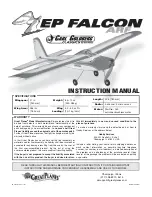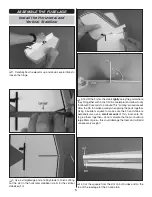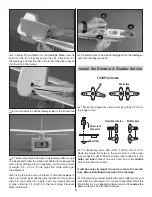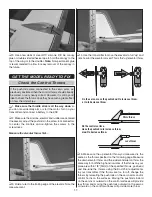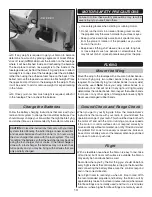
9
ASSEMBLE THE WING
Hook Up the Ailerons
1.0mm screws
Offset servo arm
Servo arm that
came with servo
❏
1. Use two of the tiny wood screws included with this kit
to mount the
offset aileron servo arm
to the bottom of the
aileron servo arm that came with your servo. Also add a few
drops of thin CA around the edges of the servo arm to securely
glue the two arms together.
❏
2. Flex the ailerons up and down several times to break
them in so they will be easier to move with the servo.
Refer to this photo for the rest of the
steps to hook up the ailerons.
❏
3. Mount the aileron servo in the wing using the screws
included with this kit or the screws that came with the servo.
❏
4. Same as was done for the elevator and rudder, temporarily
connect the aileron servo to the receiver and power up the
system so you can center the servo. Slip the aileron pushrods
up through the holes in the offset servo arm. Mount it to the
servo with the servo arm screw.
❏
5. Insert the pushrods into the screw-lock connectors on
the aileron horns. With the radio on and the servo centered,
center each aileron and tighten the screw in the screw-lock
connector to lock the pushrods down—don’t forget to add a
small drop of threadlocker on the threads of the screws.
Finish the Wing
The wing may be fi nished in either of two confi gurations: one
for indoor fl ying and another for outdoor fl ying. Of course, if
you prep the wing for outdoor fl ight it may still be fl own indoors,
but the Falcon will be slightly heavier and may not allow you
to take full advantage of its absolute slowest fl ight possibilities.
The “indoor” wing may also be fl own outdoors, but care should
be taken not to overstress the wing by performing aggressive
aerobatics or fl ying on windy days.
Perform steps 1, 2 and 3 only if
building the
outdoor
wing.
❏
1. If building the outdoor wing, test-fi t the plastic
wing
center doubler
to the top of the wing just to see how it fi ts
before
removing the protective backing from the adhesive
tape on the bottom—the best way to fi t the doubler is fi rst to
center the “lip” on the back over the trailing edge of the wing
between the ailerons, then “roll” and press the doubler forward.
❏
2. Now that you have practiced installing the doubler, remove
the backing from the tape on the bottom and carefully apply
the doubler to the wing.
❏
3. Cut the included fi ber-reinforced tape into one 24"
[610mm] piece and into one 18" [460mm] piece. Attach the
strips to the bottom of the wing where shown.
Summary of Contents for EP FALCON ARF
Page 16: ......

